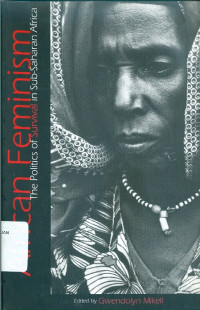
Text
African feminism: the politics of survival in sub-saharan Africa
This book is a exploration of both the discrimination that African women experience and their strategies for coping with it. Contributors present case studies of ten African states, demonstrating that-as they fight for access to land, for the right to own property, for control of food distribution, for living wages and safe working conditions, for health care, and for election reform-African women are creating a powerful and specifically African feminism. Contemporary African women sometimes think of themselves as walking a political/gender tightrope. On one hand, they are concerned about the sea of economic and political troubles facing their communities and their national “ships of state.” On the other hand, they are grappling with how to affirm their own identities while transforming societal notions of gender and familial roles. Over the past two decades, states in sub-Saharan Africa have gone through many crises: the failure of male-dominated, multi-party politics or state socialism in the aftermath of independence; the onset of coups and establishment of military regimes; the economic instability that culminated, Women in the francophone country of Côte d’Ivoire are attempting to mobilize their forces so that they can play a determining role in setting national laws that affect their status as wives. Only through increased mobilization will they be able to register their opinions in the ongoing efforts for social change designed to modernize the country and remove vestiges of what many legislators consider outmoded ethnic gender and family practices. Former President Félix Houphouët-Boigny¹ was unmatched in his desire to create a modern polity by developing Ivoirian society in the political, economic, and social policy arenas. Indeed, the goal of, The Intestate Succession Law of 1985 is part of legislation in Ghana which seeks to resolve some long-standing issues affecting the inheritance of property and the status and rights of wives and children. Together with other laws affecting marriage and divorce, and family economic accountability,¹ these constitute an attempt at legislative reform of some aspects of the “customary law,” which has been acknowledged as causing hardship and injustice for women and children (Asante 1975; Bentsi-Enchil 1964; Ollenu 1966). The passage of the Intestate Succession Law marked a success for churches, traditional authorities,² and women’s groups³ who had long pressed for...
Availability
| KP.II.000267 | KP.II MIK a | My Library | Available |
Detail Information
- Series Title
-
-
- Call Number
-
KP.II MIK a
- Publisher
- Philadelphia : University of Pennsylavania Press., 1997
- Collation
-
xv, 361p. ; 24 cm.
- Language
-
English
- ISBN/ISSN
-
0812233492
- Classification
-
KP.II
- Content Type
-
-
- Media Type
-
-
- Carrier Type
-
-
- Edition
-
-
- Subject(s)
- Specific Detail Info
-
-
- Statement of Responsibility
-
-
Other version/related
No other version available
File Attachment
Comments
You must be logged in to post a comment
 Computer Science, Information & General Works
Computer Science, Information & General Works  Philosophy & Psychology
Philosophy & Psychology  Religion
Religion  Social Sciences
Social Sciences  Language
Language  Pure Science
Pure Science  Applied Sciences
Applied Sciences  Art & Recreation
Art & Recreation  Literature
Literature  History & Geography
History & Geography